Unit 7 Art Lesson 3 A Musical Genius课件(共45张) 2024-2025学年高一英语北师版(2019)必修第三册
文档属性
| 名称 | Unit 7 Art Lesson 3 A Musical Genius课件(共45张) 2024-2025学年高一英语北师版(2019)必修第三册 |
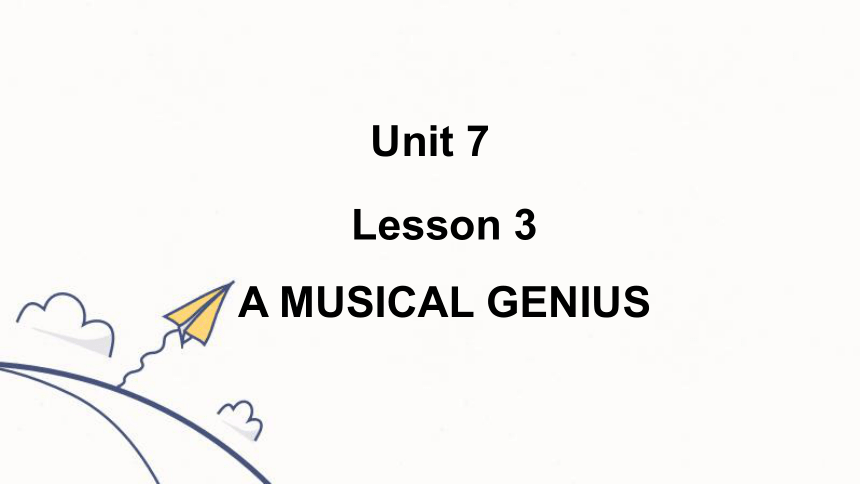
|
|
| 格式 | pptx | ||
| 文件大小 | 2.4MB | ||
| 资源类型 | 教案 | ||
| 版本资源 | 北师大版(2019) | ||
| 科目 | 英语 | ||
| 更新时间 | 2025-05-01 15:20:20 | ||
图片预览

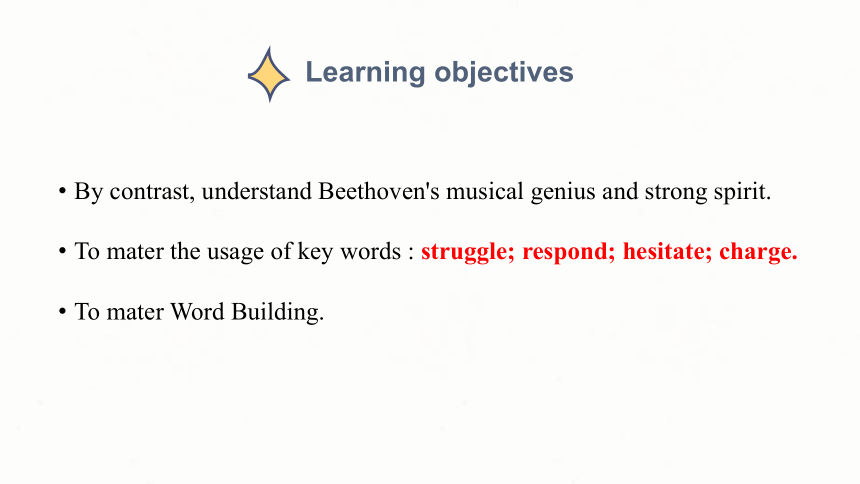
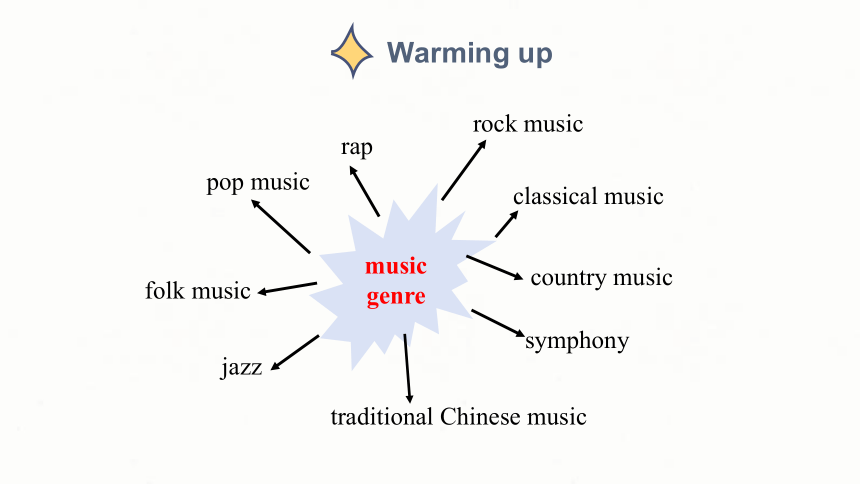
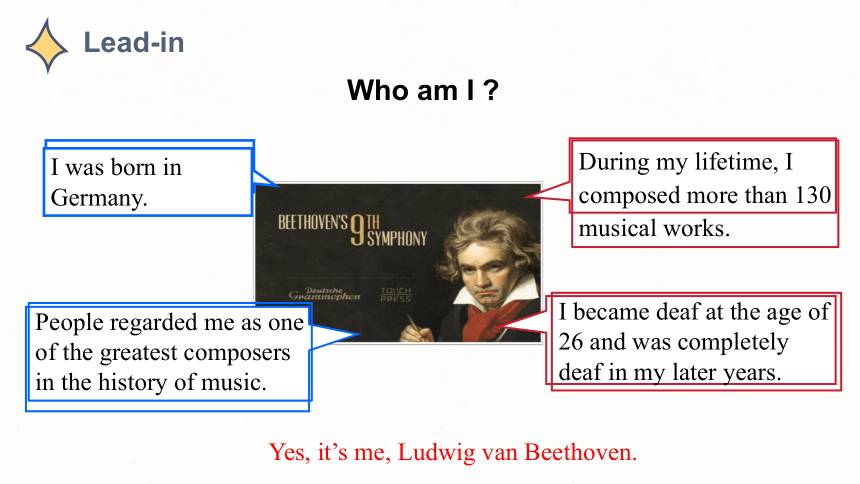
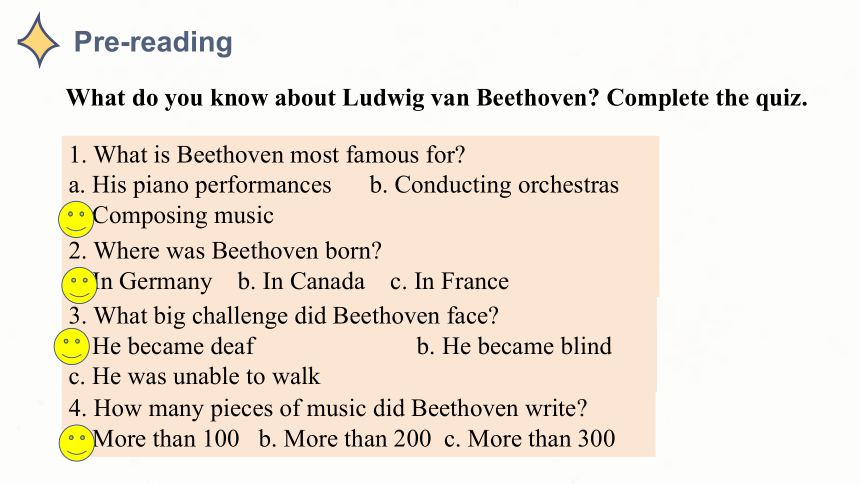
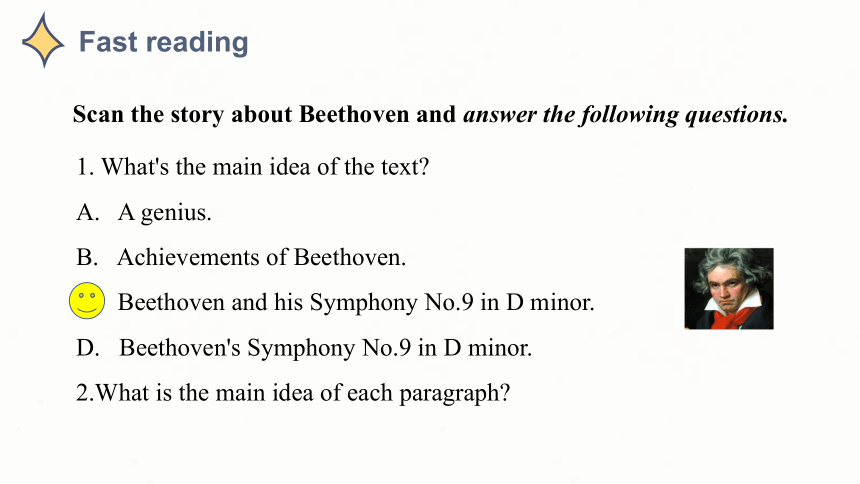
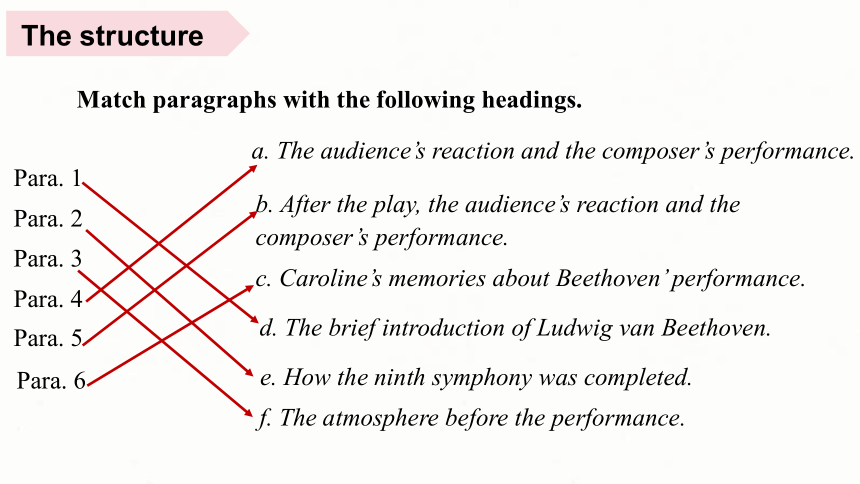
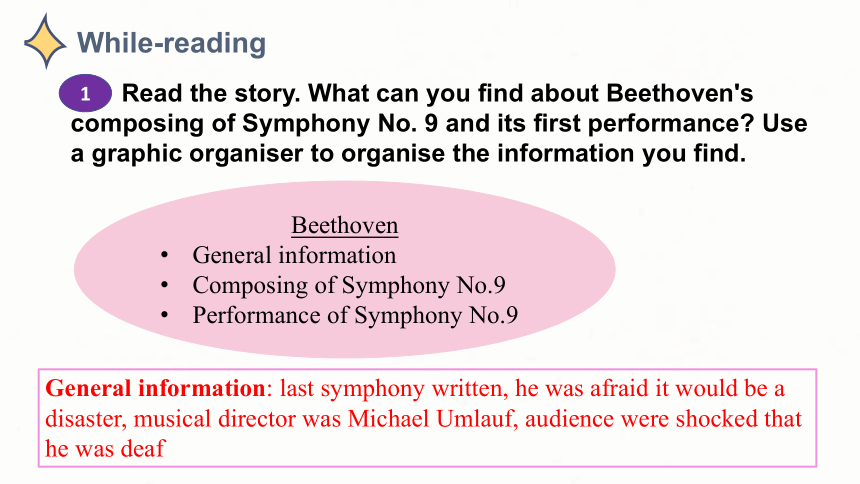
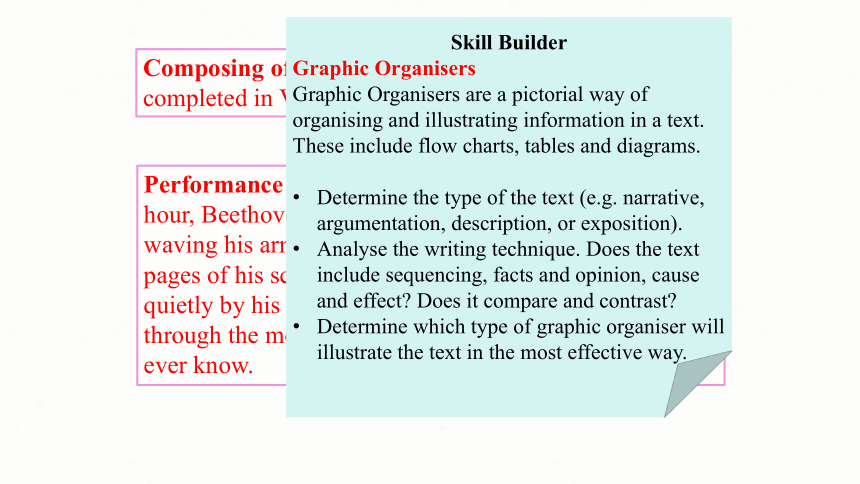
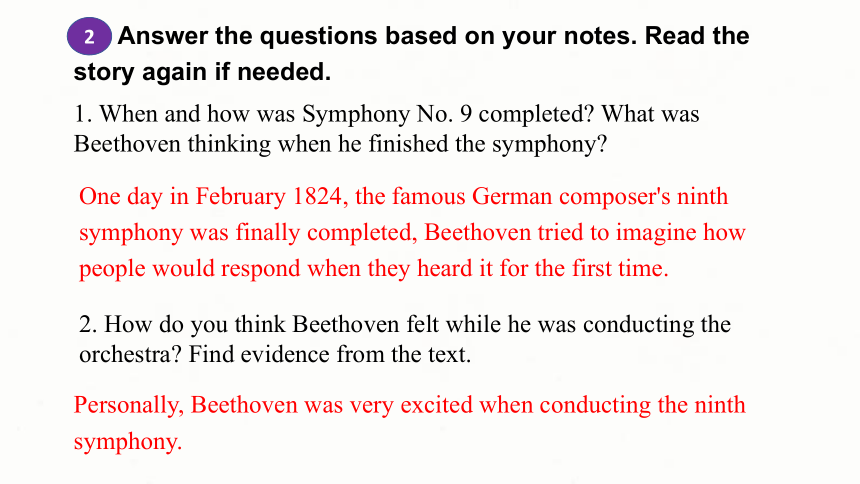
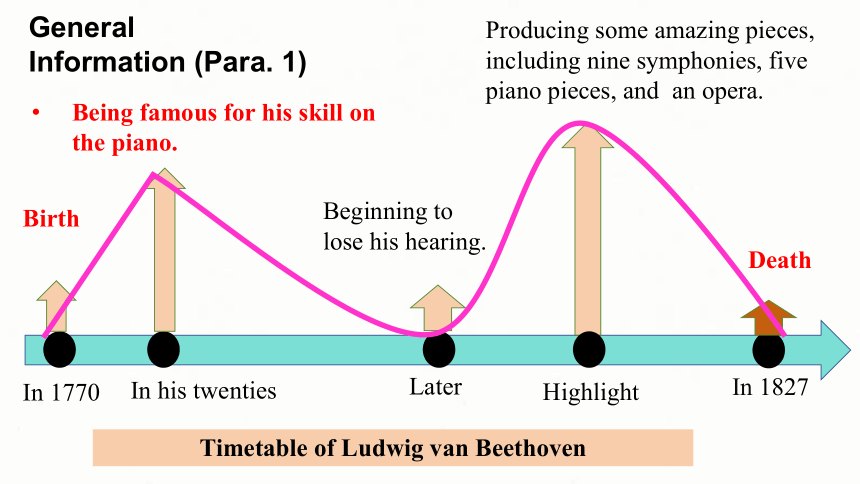
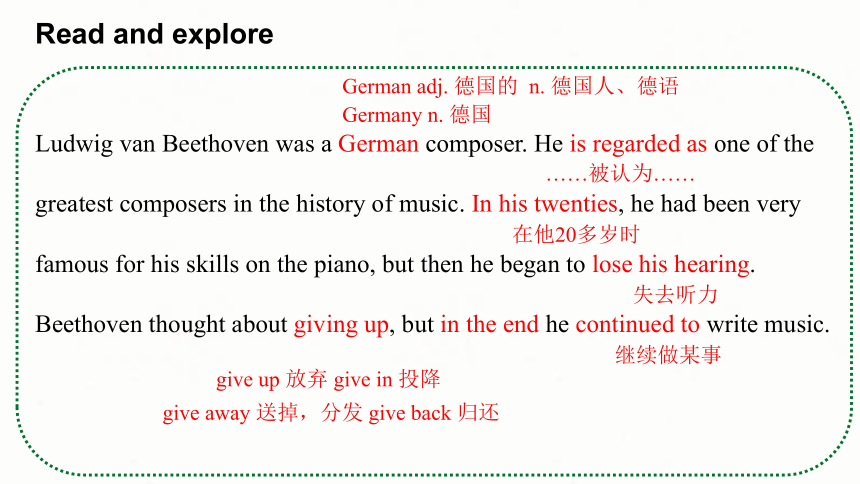
文档简介
(共45张PPT)
Lesson 3
A MUSICAL GENIUS
Unit 7
By contrast, understand Beethoven's musical genius and strong spirit.
To mater the usage of key words : struggle; respond; hesitate; charge.
To mater Word Building.
Learning objectives
music
genre
rock music
classical music
symphony
traditional Chinese music
jazz
folk music
pop music
country music
rap
Warming up
Who am I
I was born in Germany.
People regarded me as one of the greatest composers in the history of music.
During my lifetime, I composed more than 130 musical works.
I became deaf at the age of 26 and was completely deaf in my later years.
Yes, it’s me, Ludwig van Beethoven.
Lead-in
What do you know about Ludwig van Beethoven Complete the quiz.
1. What is Beethoven most famous for
a. His piano performances b. Conducting orchestras
c. Composing music
2. Where was Beethoven born
a. In Germany b. In Canada c. In France
3. What big challenge did Beethoven face
a. He became deaf b. He became blind
c. He was unable to walk
4. How many pieces of music did Beethoven write
a. More than 100 b. More than 200 c. More than 300
Pre-reading
Scan the story about Beethoven and answer the following questions.
1. What's the main idea of the text
A. A genius.
B. Achievements of Beethoven.
C. Beethoven and his Symphony No.9 in D minor.
D. Beethoven's Symphony No.9 in D minor.
2.What is the main idea of each paragraph
Fast reading
Para. 1
Para. 2
Para. 3
b. After the play, the audience’s reaction and the composer’s performance.
The structure
Match paragraphs with the following headings.
Para. 4
Para. 5
Para. 6
d. The brief introduction of Ludwig van Beethoven.
c. Caroline’s memories about Beethoven’ performance.
e. How the ninth symphony was completed.
f. The atmosphere before the performance.
a. The audience’s reaction and the composer’s performance.
Read the story. What can you find about Beethoven's composing of Symphony No. 9 and its first performance Use a graphic organiser to organise the information you find.
1
Beethoven
General information
Composing of Symphony No.9
Performance of Symphony No.9
General information: last symphony written, he was afraid it would be a disaster, musical director was Michael Umlauf, audience were shocked that he was deaf
While-reading
Composing of Symphony No.9: took several years, completed in Vienna
Performance of Symphony No.9: For more than an hour, Beethoven jumped about in front the orchestra, waving his arms widly in the air, and madly turning the pages of his score, The whole time, Umlauf stood quietly by his side, skillfully guiding the orchestra through the most amazing piece of music the world had ever know.
Skill Builder
Graphic Organisers
Graphic Organisers are a pictorial way of organising and illustrating information in a text. These include flow charts, tables and diagrams.
Determine the type of the text (e.g. narrative, argumentation, description, or exposition).
Analyse the writing technique. Does the text include sequencing, facts and opinion, cause and effect Does it compare and contrast
Determine which type of graphic organiser will illustrate the text in the most effective way.
Answer the questions based on your notes. Read the story again if needed.
2
1. When and how was Symphony No. 9 completed What was Beethoven thinking when he finished the symphony
2. How do you think Beethoven felt while he was conducting the orchestra Find evidence from the text.
Personally, Beethoven was very excited when conducting the ninth symphony.
One day in February 1824, the famous German composer's ninth symphony was finally completed, Beethoven tried to imagine how people would respond when they heard it for the first time.
In 1770
Birth
Being famous for his skill on the piano.
Later
Beginning to lose his hearing.
Highlight
In 1827
Death
In his twenties
Producing some amazing pieces, including nine symphonies, five piano pieces, and an opera.
Timetable of Ludwig van Beethoven
General Information (Para. 1)
Ludwig van Beethoven was a German composer. He is regarded as one of the greatest composers in the history of music. In his twenties, he had been very famous for his skills on the piano, but then he began to lose his hearing. Beethoven thought about giving up, but in the end he continued to write music.
……被认为……
在他20多岁时
German adj. 德国的 n. 德国人、德语
Germany n. 德国
give up 放弃 give in 投降
give away 送掉,分发 give back 归还
失去听力
Read and explore
继续做某事
Inspired by (过去分词短语作原因状语) his struggles with deafness, the composer produced some amazing pieces, including nine symphonies, five piano pieces, and an opera! He proceeded with the composition until his death in 1827, writing more than 130 musical works (现在分词短语作结果状语), including his Symphony No.9 in D minor.
与……斗争
作品
be inspired by 被……鼓舞
die: v. 死
dead: adj. 死了的
dying: adj. 奄奄一息的
Read and explore
继续
including sth= sth included
n. 死亡
Composing of Symphony No.9 (Para. 2)
Ludwig van Beethoven
1. When and was Symphony No.9
completed
2. What was Beethoven thinking when
he finished the Symphony No.9
One day in February 1824
He was imagining how people would respond to it.
One day in February 1824, at his little house in Vienna, Austria, Ludwig van Beethoven sat back in his chair and smiled. The famous German composer’s ninth symphony was finally completed. Writing the piece had taken several years, and now the final notes had been added to the score.
轻松的坐着
添加
Read and explore
At 54 years of age, he didn’t know that this would be his last symphony. As (时间状语从句) he proudly signed his name at the bottom of the page, Beethoven tried to imagine how (宾语从句) people would respond when (时间状语从句) they heard it for the first time.
当……时
在……底部
Read and explore
第一次
Performance of Symphony No. 9 (Para 3 ~ 6)
Ludwig van Beethoven:
Before
During
After
The audience:
Read sentences related to people’s reactions and use some adjectives to describe them.
Audience’s reaction to the performance
The audience did not hesitate to applaud loudly as the famous composer walked out onto the stage for the first time in 12 years.
As the final, joyous note signalled the end of the symphony, the audience jumped to their feet, clapping and waving their hats.
The audience was shocked as well.
respectful, excited
excited, impressed
Before the performance, the backstage atmosphere at a very famous theatre in Vienna was tense. Beethoven was afraid that the performance would be a disaster. After all, what use is a conductor who(定语从句) could not hear his orchestra—even if (让步状语从句)he is a musical genius (毕竟,一个听不到自己的管弦乐队的指挥,即使他是音乐天才,能有什么用呢?)
back(后面的)+stage(舞台)=后台的
Read and explore
毕竟
The audience did not hesitate to applaud loudly as the famous composer walked out onto the stage for the first time in 12 years. The theatre’s musical director, Michael Umlauf, joined him and together the two men took charge of the orchestra. For more than an hour, Beethoven jumped about in front of the orchestra, waving his arms wildly in the air, and madly turning (两个并列的现在分词短语作伴随状语) the pages of his score.
犹豫做某事
负责、控制
疯狂地
Read and explore
忘情地
The whole time, Umlauf stood quietly by his side, skillfully guiding the orchestra through (现在分词短语作伴随状语) the most amazing piece of music the world had ever known.
奥姆洛夫一直安静地站在他的身边,巧妙地指挥管弦乐队演奏这首世界上有史以来的最神奇的音乐作品。
quiet: adj. 安静的
quite: adv. 非常、相当
在他身边
Read and explore
定语从句
As(时间状语从句) the final, joyous note signalled the end of the symphony, the audience jumped to their feet, clapping, cheering and waving(现在分词短语作伴随状语) their hats. But Beethovern continued conducting, his head buried in the score. It was not until Caroline Unger, one of the singers, took his arm and turned him to face the audience that the great man realised his symphony was a success.
be buried in: 埋头于、专心于
跳起来
Read and explore
挽着胳膊
Complete the sentences with the phrases below.
took charge of, waving their hats, waving his arms wildly, jumped about, turned him to face, backstage atmosphere,
madly turning the pages, jumped to their feet, with a broad smile
1. Before the performance, the _____________________ was tense.
2. Michael Umlauf joined him and together the two men _____________ the orchestra.
3. Beethoven _____________ in front of the orchestra, ___________________ in the air, and _____________________ of his score.
backstage atmosphere
took charge of
jumped about
waving his arms wildly
madly turning the pages
Exercise
4. As the final note signalled the end, the audience _________________, clapping, cheering, and _______________.
5. Caroline Unger took Beethoven’s arm and ________________ the
audience.
6. In an interview afterwards, Caroline said _________________, “The audience was shocked as well.
jumped to their feet
waving their hats
turned him to face
with a broad smile
1.struggle n. 奋斗 vi. 奋斗,拼搏
【原句】(P 14) Inspired by his struggles with deafness, the composer produced some amazing pieces... 受到与失聪作斗争的启发,这位作曲家创作了一些令人惊叹的作品……
Learning points
(1)The soldiers have been struggling _______ the flood day and
night for a week.
战士们已经夜以继日地和洪水抗战一个星期了。
(2)Despite his terrible injuries, the man wouldn’t _______________________
尽管这个男人身负重伤,但他仍然不会放弃求生的努力。
(3)Though he was badly wounded, he ________________________ and went on running.
虽然他伤得很重,但他挣扎着站起来继续往前跑。
(4)It was___________ for me to make myself heard as the children
talked so loudly at dinner table.
孩子们吃饭时大声说话,我要使自己的话被他们听见真费力。
against
struggled to his feet
a struggle
give up the struggle for life.
2. ...Beethoven tried to imagine how people would respond when they heard it for the first time. ……贝多芬努力想象人们第一次听到这首曲子时会作何反应。
respond vi. & vt. 回应,回复
【归纳拓展】
※ respond to 回应;回答
respond with a smile 报以微笑
respond that 回答
※ 派生:response n. 回答;反应
in response(to) 作为(对……的)回答/反应
make no response(to) 没有(对……)做答/回答
(1) How did they respond ______ the news
他们对这则消息有什么反应?
(2) I waved to her and she _____________________.
我向她挥挥手,她对我报以微笑。
(3) __________________________________________________
他回答说他太忙没空做那个任务。
(4) The government acted ______________economic pressure.
政府为应对经济压力采取了行动。
responded with a smile
to
He responds that he is too busy to do the task.
in response to
3. The audience did not hesitate to applaud loudly....
观众毫不犹豫地大声鼓掌……
hesitate vi. 犹豫,踌躇
【归纳拓展】
※ hesitate to do sth. 犹豫做某事
do not hesitate to do sth. 毫不犹豫做某事
※ 派生:hesitation n. 犹豫
without hesitation 毫不迟疑
(1)I wouldn’t hesitate _________ (go)through fire and water for the just cause.
(2)____________________, she leapt into the water and saved the drowning child.
她果断地跳入水中,救起溺水的孩子。
(3)I have no _________(hesitate) in recommending her for the job.
(4) If a student gets hungry on the long drives to and from school,
Wilson never _________________________.
如果有学生在往返学校的长途车程中饿了,威尔逊会毫
不犹豫地给他买一顿饭。
hesitation
to go
Without hesitation
hesitates to buy him a meal
4. The theatre’s musical director, Michael Umlauf, joined him and together the two men took charge of the orchestra.
剧院音乐指挥迈克尔·乌姆洛夫也走上台和他一起指挥乐队。
charge n. 主管,负责
【归纳拓展】
※ free of charge/free/for free 免费
in charge of 主管;负责(状态)
in the charge of/in one's charge 由……主管;由……负责
take charge of 负责;主管(动作)
※ vt. 收费,控告,充电
charge sb. money for… 因……向某人收费
charge sb. with sth. 因某事控告某人
charge the battery 给电池充电
(1) When we shop online, delivery is ________________ in most cases.
当我们网上购物时,多数情况下免费送货。
(2) He took charge of the farm after his father’s death; now the
farm is still _____________.
他在父亲去世后掌管了农场,现在农场仍在他的掌管之下。
(3) The restaurant charged me 20______ dinner.
这家餐馆收了我20英镑的餐费。
free of charge
in his charge
for
5. It was not until Caroline Unger,one of the singers,took his arm and turned him to face the audience that the great man realised his symphony was a success.
[句式分析] 本句是一个 句型。It was...that...强调了 not until...;one of the singers是Caroline Unger的 ;his symphony was a success是省略了 的 从句。
[自主翻译] ___________________________________________________
_______________________________________________________________
强调
时间状语
同位语
that
宾语
直到歌手卡罗琳·昂格尔拉着他的手臂转向观众,这位伟人才意识到他的交响乐取得了成功。
英语中有Conversion(转化法), Derivation(派生法) , Compounding(合成法) ,Clipping(缩略法),Blending(混合法)
Acronym(首尾字母缩略法) 几种构词法。
其中,派生法(Derivation)就是由词根加上词缀(前缀或后缀)构成的新词。后缀是加在一个单词后面的音节,能够改变单词的词性,有的也可改变词义。
派生法
在词根前面加前缀或者在词根后面加后缀,从而构成一个和原单词意义相近或者相反的新词。
1.前缀
前缀一般改变单词的意义,不改变词性(除少数英语前缀外)
1)表示否定意义的前缀
dis-, il-, in-, ir-, mis-, non-, un-等,在单词前加这类前缀常构成与该词意义相反的新词。
例如:like-dislike; happy-unhappy; existent-nonexistent; understand-misunderstand
构词法(Word Building)
2) 表示其他意义的前缀:
a- (多构成表语形容词), anti-(反对), auto-(自动), co-(共同), en-(使), inter-(互相), re-(又;再), sub-(下面的;次;小), tele-(强调距离)等。
例如:like-alike; war-antiwar; matic-automatic; worker-coworker; large-enlarge; national-international; union-reunion; way-subway; phone-telephone
2.后缀
后缀一般改变单词的词性,少数后缀会改变单词的词义。
1)构成名词的后缀
-tion(动作;过程), -ness(性质;状态), -ment(性质;状态), -ian(精通……的人), -ist(专业人员), -er/or(从事某事的人)
例如:produce-production; deaf-deafness; move-movement; music-musician; femine-feminist; lead-leader/direct-director
2)构成动词的后缀
-en(多用于形容词之后), -fy(使……化), -ize(使……成为)
例如:sharp-sharpen; beauty-beautify; real-realize
3)构成形容词的后缀
-al/able (有……能力的), -ive(性质;倾向), -ous(具有……), -ful(充满……), -less(表示否定)
例如:music-musical; act-active; joy-joyous; use-useful; home-homeless
Complete the Word Builder. Use a dictionary to help you.
Noun Verb Adjective
music musician ×
composition ×
performance ×
produce
× conduct ×
hesitate
joy enjoy
respond
musical
composer
compose
performer
perform
production
productive
conductor
hesitation
hesitated
joyous
response
responsive
producer
Look at one of the words ‘produce’ and try to answer some questions.
1. What part of speech is it
2. What is the adjective form How did the word change
3. What are the noun forms How did the word change
Answers
1. It is a verb.
2. productive. It changed by adding the suffix “ive” to the end of the word.
3. producer, production. It changed by adding the suffixes “er” and “ion” to the end of the word.
Now let’s discuss and summarise the use of Word Building.
Complete the sentences with the correct form of the words in the Word Builder.
1. It has always been my dream to ________ an orchestra.
2. The musician __________ with nervousness before he began to play.
3. Beethoven is recognised as a _______ genius by people around the world.
4. Beethoven is the _________ of Symphony No. 9 in D minor.
5. To his mother’s ____, he won first prize.
6. She told me about the wonderful ___________ that she had been to last week.
7. The audience’s _________ to the performance of the symphony was extraordinary.
8. Though Beethoven lost his hearing, he _________ some amazing pieces of music.
conduct
hesitated
musical
composer
joy
performance
response
produced
1. The description of Beethoven’s behaviour in the performance shows that he was deaf. Can you find the hints Why did most of the audience have no idea that he was deaf
“And the whole time, Umlauf stood quietly by his side, skillfully guiding the orchestra.”
The music ended but Beethoven continued to conduct.
“It was not until Caroline Unger took his arm and turned him to face the audience that the great man had realised his symphony was a success.”
Think and Share
2. How did Caroline feel when she said “The one person in the room who didn’t hear the symphony — and never would — was the very man who composed it.”
She felt very very sorry that Beethoven couldn’t hear the music he composed. It was such a pity and she might feel it unfair for him. She must have wished Beethoven was not deaf.
1 Learn how Beethoven created Symphony No.9 and how it was shown for the first time.
2 Learn skill builder—graphic organisers.
3 Learn word builder—prefix and suffix
Summary
Find some pieces of Beethoven’s music and his life story online. Discuss how you feel when listening to music.
Preview focus on language : word building.
Homework
Lesson 3
A MUSICAL GENIUS
Unit 7
By contrast, understand Beethoven's musical genius and strong spirit.
To mater the usage of key words : struggle; respond; hesitate; charge.
To mater Word Building.
Learning objectives
music
genre
rock music
classical music
symphony
traditional Chinese music
jazz
folk music
pop music
country music
rap
Warming up
Who am I
I was born in Germany.
People regarded me as one of the greatest composers in the history of music.
During my lifetime, I composed more than 130 musical works.
I became deaf at the age of 26 and was completely deaf in my later years.
Yes, it’s me, Ludwig van Beethoven.
Lead-in
What do you know about Ludwig van Beethoven Complete the quiz.
1. What is Beethoven most famous for
a. His piano performances b. Conducting orchestras
c. Composing music
2. Where was Beethoven born
a. In Germany b. In Canada c. In France
3. What big challenge did Beethoven face
a. He became deaf b. He became blind
c. He was unable to walk
4. How many pieces of music did Beethoven write
a. More than 100 b. More than 200 c. More than 300
Pre-reading
Scan the story about Beethoven and answer the following questions.
1. What's the main idea of the text
A. A genius.
B. Achievements of Beethoven.
C. Beethoven and his Symphony No.9 in D minor.
D. Beethoven's Symphony No.9 in D minor.
2.What is the main idea of each paragraph
Fast reading
Para. 1
Para. 2
Para. 3
b. After the play, the audience’s reaction and the composer’s performance.
The structure
Match paragraphs with the following headings.
Para. 4
Para. 5
Para. 6
d. The brief introduction of Ludwig van Beethoven.
c. Caroline’s memories about Beethoven’ performance.
e. How the ninth symphony was completed.
f. The atmosphere before the performance.
a. The audience’s reaction and the composer’s performance.
Read the story. What can you find about Beethoven's composing of Symphony No. 9 and its first performance Use a graphic organiser to organise the information you find.
1
Beethoven
General information
Composing of Symphony No.9
Performance of Symphony No.9
General information: last symphony written, he was afraid it would be a disaster, musical director was Michael Umlauf, audience were shocked that he was deaf
While-reading
Composing of Symphony No.9: took several years, completed in Vienna
Performance of Symphony No.9: For more than an hour, Beethoven jumped about in front the orchestra, waving his arms widly in the air, and madly turning the pages of his score, The whole time, Umlauf stood quietly by his side, skillfully guiding the orchestra through the most amazing piece of music the world had ever know.
Skill Builder
Graphic Organisers
Graphic Organisers are a pictorial way of organising and illustrating information in a text. These include flow charts, tables and diagrams.
Determine the type of the text (e.g. narrative, argumentation, description, or exposition).
Analyse the writing technique. Does the text include sequencing, facts and opinion, cause and effect Does it compare and contrast
Determine which type of graphic organiser will illustrate the text in the most effective way.
Answer the questions based on your notes. Read the story again if needed.
2
1. When and how was Symphony No. 9 completed What was Beethoven thinking when he finished the symphony
2. How do you think Beethoven felt while he was conducting the orchestra Find evidence from the text.
Personally, Beethoven was very excited when conducting the ninth symphony.
One day in February 1824, the famous German composer's ninth symphony was finally completed, Beethoven tried to imagine how people would respond when they heard it for the first time.
In 1770
Birth
Being famous for his skill on the piano.
Later
Beginning to lose his hearing.
Highlight
In 1827
Death
In his twenties
Producing some amazing pieces, including nine symphonies, five piano pieces, and an opera.
Timetable of Ludwig van Beethoven
General Information (Para. 1)
Ludwig van Beethoven was a German composer. He is regarded as one of the greatest composers in the history of music. In his twenties, he had been very famous for his skills on the piano, but then he began to lose his hearing. Beethoven thought about giving up, but in the end he continued to write music.
……被认为……
在他20多岁时
German adj. 德国的 n. 德国人、德语
Germany n. 德国
give up 放弃 give in 投降
give away 送掉,分发 give back 归还
失去听力
Read and explore
继续做某事
Inspired by (过去分词短语作原因状语) his struggles with deafness, the composer produced some amazing pieces, including nine symphonies, five piano pieces, and an opera! He proceeded with the composition until his death in 1827, writing more than 130 musical works (现在分词短语作结果状语), including his Symphony No.9 in D minor.
与……斗争
作品
be inspired by 被……鼓舞
die: v. 死
dead: adj. 死了的
dying: adj. 奄奄一息的
Read and explore
继续
including sth= sth included
n. 死亡
Composing of Symphony No.9 (Para. 2)
Ludwig van Beethoven
1. When and was Symphony No.9
completed
2. What was Beethoven thinking when
he finished the Symphony No.9
One day in February 1824
He was imagining how people would respond to it.
One day in February 1824, at his little house in Vienna, Austria, Ludwig van Beethoven sat back in his chair and smiled. The famous German composer’s ninth symphony was finally completed. Writing the piece had taken several years, and now the final notes had been added to the score.
轻松的坐着
添加
Read and explore
At 54 years of age, he didn’t know that this would be his last symphony. As (时间状语从句) he proudly signed his name at the bottom of the page, Beethoven tried to imagine how (宾语从句) people would respond when (时间状语从句) they heard it for the first time.
当……时
在……底部
Read and explore
第一次
Performance of Symphony No. 9 (Para 3 ~ 6)
Ludwig van Beethoven:
Before
During
After
The audience:
Read sentences related to people’s reactions and use some adjectives to describe them.
Audience’s reaction to the performance
The audience did not hesitate to applaud loudly as the famous composer walked out onto the stage for the first time in 12 years.
As the final, joyous note signalled the end of the symphony, the audience jumped to their feet, clapping and waving their hats.
The audience was shocked as well.
respectful, excited
excited, impressed
Before the performance, the backstage atmosphere at a very famous theatre in Vienna was tense. Beethoven was afraid that the performance would be a disaster. After all, what use is a conductor who(定语从句) could not hear his orchestra—even if (让步状语从句)he is a musical genius (毕竟,一个听不到自己的管弦乐队的指挥,即使他是音乐天才,能有什么用呢?)
back(后面的)+stage(舞台)=后台的
Read and explore
毕竟
The audience did not hesitate to applaud loudly as the famous composer walked out onto the stage for the first time in 12 years. The theatre’s musical director, Michael Umlauf, joined him and together the two men took charge of the orchestra. For more than an hour, Beethoven jumped about in front of the orchestra, waving his arms wildly in the air, and madly turning (两个并列的现在分词短语作伴随状语) the pages of his score.
犹豫做某事
负责、控制
疯狂地
Read and explore
忘情地
The whole time, Umlauf stood quietly by his side, skillfully guiding the orchestra through (现在分词短语作伴随状语) the most amazing piece of music the world had ever known.
奥姆洛夫一直安静地站在他的身边,巧妙地指挥管弦乐队演奏这首世界上有史以来的最神奇的音乐作品。
quiet: adj. 安静的
quite: adv. 非常、相当
在他身边
Read and explore
定语从句
As(时间状语从句) the final, joyous note signalled the end of the symphony, the audience jumped to their feet, clapping, cheering and waving(现在分词短语作伴随状语) their hats. But Beethovern continued conducting, his head buried in the score. It was not until Caroline Unger, one of the singers, took his arm and turned him to face the audience that the great man realised his symphony was a success.
be buried in: 埋头于、专心于
跳起来
Read and explore
挽着胳膊
Complete the sentences with the phrases below.
took charge of, waving their hats, waving his arms wildly, jumped about, turned him to face, backstage atmosphere,
madly turning the pages, jumped to their feet, with a broad smile
1. Before the performance, the _____________________ was tense.
2. Michael Umlauf joined him and together the two men _____________ the orchestra.
3. Beethoven _____________ in front of the orchestra, ___________________ in the air, and _____________________ of his score.
backstage atmosphere
took charge of
jumped about
waving his arms wildly
madly turning the pages
Exercise
4. As the final note signalled the end, the audience _________________, clapping, cheering, and _______________.
5. Caroline Unger took Beethoven’s arm and ________________ the
audience.
6. In an interview afterwards, Caroline said _________________, “The audience was shocked as well.
jumped to their feet
waving their hats
turned him to face
with a broad smile
1.struggle n. 奋斗 vi. 奋斗,拼搏
【原句】(P 14) Inspired by his struggles with deafness, the composer produced some amazing pieces... 受到与失聪作斗争的启发,这位作曲家创作了一些令人惊叹的作品……
Learning points
(1)The soldiers have been struggling _______ the flood day and
night for a week.
战士们已经夜以继日地和洪水抗战一个星期了。
(2)Despite his terrible injuries, the man wouldn’t _______________________
尽管这个男人身负重伤,但他仍然不会放弃求生的努力。
(3)Though he was badly wounded, he ________________________ and went on running.
虽然他伤得很重,但他挣扎着站起来继续往前跑。
(4)It was___________ for me to make myself heard as the children
talked so loudly at dinner table.
孩子们吃饭时大声说话,我要使自己的话被他们听见真费力。
against
struggled to his feet
a struggle
give up the struggle for life.
2. ...Beethoven tried to imagine how people would respond when they heard it for the first time. ……贝多芬努力想象人们第一次听到这首曲子时会作何反应。
respond vi. & vt. 回应,回复
【归纳拓展】
※ respond to 回应;回答
respond with a smile 报以微笑
respond that 回答
※ 派生:response n. 回答;反应
in response(to) 作为(对……的)回答/反应
make no response(to) 没有(对……)做答/回答
(1) How did they respond ______ the news
他们对这则消息有什么反应?
(2) I waved to her and she _____________________.
我向她挥挥手,她对我报以微笑。
(3) __________________________________________________
他回答说他太忙没空做那个任务。
(4) The government acted ______________economic pressure.
政府为应对经济压力采取了行动。
responded with a smile
to
He responds that he is too busy to do the task.
in response to
3. The audience did not hesitate to applaud loudly....
观众毫不犹豫地大声鼓掌……
hesitate vi. 犹豫,踌躇
【归纳拓展】
※ hesitate to do sth. 犹豫做某事
do not hesitate to do sth. 毫不犹豫做某事
※ 派生:hesitation n. 犹豫
without hesitation 毫不迟疑
(1)I wouldn’t hesitate _________ (go)through fire and water for the just cause.
(2)____________________, she leapt into the water and saved the drowning child.
她果断地跳入水中,救起溺水的孩子。
(3)I have no _________(hesitate) in recommending her for the job.
(4) If a student gets hungry on the long drives to and from school,
Wilson never _________________________.
如果有学生在往返学校的长途车程中饿了,威尔逊会毫
不犹豫地给他买一顿饭。
hesitation
to go
Without hesitation
hesitates to buy him a meal
4. The theatre’s musical director, Michael Umlauf, joined him and together the two men took charge of the orchestra.
剧院音乐指挥迈克尔·乌姆洛夫也走上台和他一起指挥乐队。
charge n. 主管,负责
【归纳拓展】
※ free of charge/free/for free 免费
in charge of 主管;负责(状态)
in the charge of/in one's charge 由……主管;由……负责
take charge of 负责;主管(动作)
※ vt. 收费,控告,充电
charge sb. money for… 因……向某人收费
charge sb. with sth. 因某事控告某人
charge the battery 给电池充电
(1) When we shop online, delivery is ________________ in most cases.
当我们网上购物时,多数情况下免费送货。
(2) He took charge of the farm after his father’s death; now the
farm is still _____________.
他在父亲去世后掌管了农场,现在农场仍在他的掌管之下。
(3) The restaurant charged me 20______ dinner.
这家餐馆收了我20英镑的餐费。
free of charge
in his charge
for
5. It was not until Caroline Unger,one of the singers,took his arm and turned him to face the audience that the great man realised his symphony was a success.
[句式分析] 本句是一个 句型。It was...that...强调了 not until...;one of the singers是Caroline Unger的 ;his symphony was a success是省略了 的 从句。
[自主翻译] ___________________________________________________
_______________________________________________________________
强调
时间状语
同位语
that
宾语
直到歌手卡罗琳·昂格尔拉着他的手臂转向观众,这位伟人才意识到他的交响乐取得了成功。
英语中有Conversion(转化法), Derivation(派生法) , Compounding(合成法) ,Clipping(缩略法),Blending(混合法)
Acronym(首尾字母缩略法) 几种构词法。
其中,派生法(Derivation)就是由词根加上词缀(前缀或后缀)构成的新词。后缀是加在一个单词后面的音节,能够改变单词的词性,有的也可改变词义。
派生法
在词根前面加前缀或者在词根后面加后缀,从而构成一个和原单词意义相近或者相反的新词。
1.前缀
前缀一般改变单词的意义,不改变词性(除少数英语前缀外)
1)表示否定意义的前缀
dis-, il-, in-, ir-, mis-, non-, un-等,在单词前加这类前缀常构成与该词意义相反的新词。
例如:like-dislike; happy-unhappy; existent-nonexistent; understand-misunderstand
构词法(Word Building)
2) 表示其他意义的前缀:
a- (多构成表语形容词), anti-(反对), auto-(自动), co-(共同), en-(使), inter-(互相), re-(又;再), sub-(下面的;次;小), tele-(强调距离)等。
例如:like-alike; war-antiwar; matic-automatic; worker-coworker; large-enlarge; national-international; union-reunion; way-subway; phone-telephone
2.后缀
后缀一般改变单词的词性,少数后缀会改变单词的词义。
1)构成名词的后缀
-tion(动作;过程), -ness(性质;状态), -ment(性质;状态), -ian(精通……的人), -ist(专业人员), -er/or(从事某事的人)
例如:produce-production; deaf-deafness; move-movement; music-musician; femine-feminist; lead-leader/direct-director
2)构成动词的后缀
-en(多用于形容词之后), -fy(使……化), -ize(使……成为)
例如:sharp-sharpen; beauty-beautify; real-realize
3)构成形容词的后缀
-al/able (有……能力的), -ive(性质;倾向), -ous(具有……), -ful(充满……), -less(表示否定)
例如:music-musical; act-active; joy-joyous; use-useful; home-homeless
Complete the Word Builder. Use a dictionary to help you.
Noun Verb Adjective
music musician ×
composition ×
performance ×
produce
× conduct ×
hesitate
joy enjoy
respond
musical
composer
compose
performer
perform
production
productive
conductor
hesitation
hesitated
joyous
response
responsive
producer
Look at one of the words ‘produce’ and try to answer some questions.
1. What part of speech is it
2. What is the adjective form How did the word change
3. What are the noun forms How did the word change
Answers
1. It is a verb.
2. productive. It changed by adding the suffix “ive” to the end of the word.
3. producer, production. It changed by adding the suffixes “er” and “ion” to the end of the word.
Now let’s discuss and summarise the use of Word Building.
Complete the sentences with the correct form of the words in the Word Builder.
1. It has always been my dream to ________ an orchestra.
2. The musician __________ with nervousness before he began to play.
3. Beethoven is recognised as a _______ genius by people around the world.
4. Beethoven is the _________ of Symphony No. 9 in D minor.
5. To his mother’s ____, he won first prize.
6. She told me about the wonderful ___________ that she had been to last week.
7. The audience’s _________ to the performance of the symphony was extraordinary.
8. Though Beethoven lost his hearing, he _________ some amazing pieces of music.
conduct
hesitated
musical
composer
joy
performance
response
produced
1. The description of Beethoven’s behaviour in the performance shows that he was deaf. Can you find the hints Why did most of the audience have no idea that he was deaf
“And the whole time, Umlauf stood quietly by his side, skillfully guiding the orchestra.”
The music ended but Beethoven continued to conduct.
“It was not until Caroline Unger took his arm and turned him to face the audience that the great man had realised his symphony was a success.”
Think and Share
2. How did Caroline feel when she said “The one person in the room who didn’t hear the symphony — and never would — was the very man who composed it.”
She felt very very sorry that Beethoven couldn’t hear the music he composed. It was such a pity and she might feel it unfair for him. She must have wished Beethoven was not deaf.
1 Learn how Beethoven created Symphony No.9 and how it was shown for the first time.
2 Learn skill builder—graphic organisers.
3 Learn word builder—prefix and suffix
Summary
Find some pieces of Beethoven’s music and his life story online. Discuss how you feel when listening to music.
Preview focus on language : word building.
Homework
同课章节目录
- Unit 7 Art
- Lesson 1 Masterpieces
- Lesson 2 Beijing Opera
- Lesson 3 A Musical Genius
- Unit 8 Green living
- Lesson 1 Roots and Shoots
- Lesson 2 Greening the Desert
- Lesson 3 "White Bikes" on the Road
- Unit 9 Learning
- Lesson 1 Active Learning
- Lesson 2 Language Learning Tips
- Lesson 3 The Secrets of Your Memory
